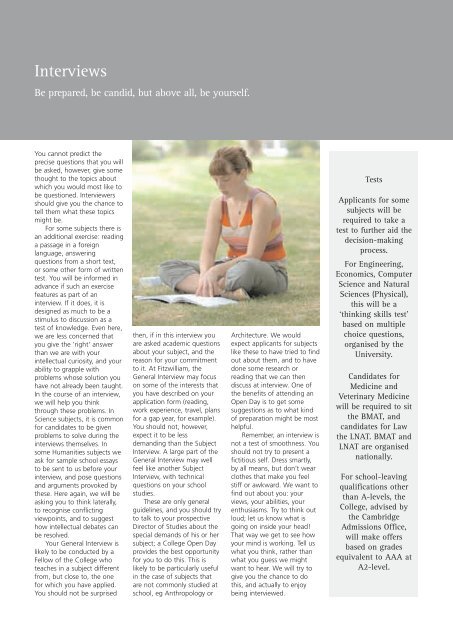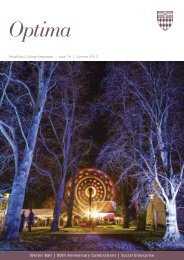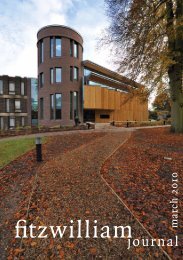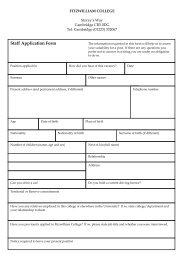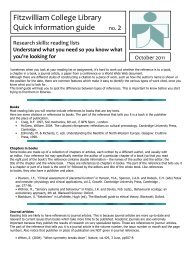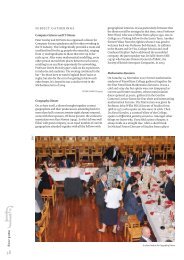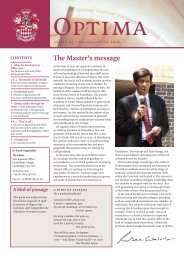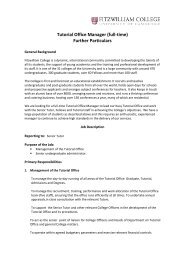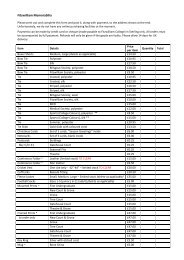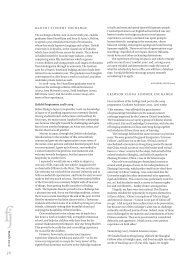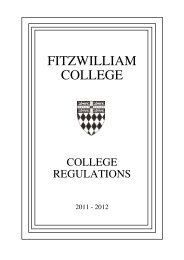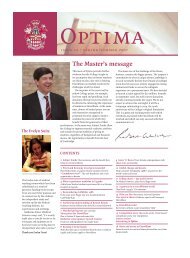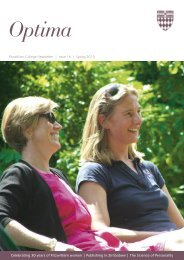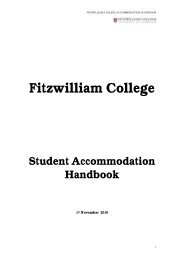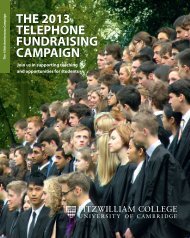Fitzwilliam College, Cambridge - Fitzwilliam College - University of ...
Fitzwilliam College, Cambridge - Fitzwilliam College - University of ...
Fitzwilliam College, Cambridge - Fitzwilliam College - University of ...
Create successful ePaper yourself
Turn your PDF publications into a flip-book with our unique Google optimized e-Paper software.
Interviews<br />
Be prepared, be candid, but above all, be yourself.<br />
You cannot predict the<br />
precise questions that you will<br />
be asked, however, give some<br />
thought to the topics about<br />
which you would most like to<br />
be questioned. Interviewers<br />
should give you the chance to<br />
tell them what these topics<br />
might be.<br />
For some subjects there is<br />
an additional exercise: reading<br />
a passage in a foreign<br />
language, answering<br />
questions from a short text,<br />
or some other form <strong>of</strong> written<br />
test. You will be informed in<br />
advance if such an exercise<br />
features as part <strong>of</strong> an<br />
interview. If it does, it is<br />
designed as much to be a<br />
stimulus to discussion as a<br />
test <strong>of</strong> knowledge. Even here,<br />
we are less concerned that<br />
you give the 'right' answer<br />
than we are with your<br />
intellectual curiosity, and your<br />
ability to grapple with<br />
problems whose solution you<br />
have not already been taught.<br />
In the course <strong>of</strong> an interview,<br />
we will help you think<br />
through these problems. In<br />
Science subjects, it is common<br />
for candidates to be given<br />
problems to solve during the<br />
interviews themselves. In<br />
some Humanities subjects we<br />
ask for sample school essays<br />
to be sent to us before your<br />
interview, and pose questions<br />
and arguments provoked by<br />
these. Here again, we will be<br />
asking you to think laterally,<br />
to recognise conflicting<br />
viewpoints, and to suggest<br />
how intellectual debates can<br />
be resolved.<br />
Your General Interview is<br />
likely to be conducted by a<br />
Fellow <strong>of</strong> the <strong>College</strong> who<br />
teaches in a subject different<br />
from, but close to, the one<br />
for which you have applied.<br />
You should not be surprised<br />
then, if in this interview you<br />
are asked academic questions<br />
about your subject, and the<br />
reason for your commitment<br />
to it. At <strong>Fitzwilliam</strong>, the<br />
General Interview may focus<br />
on some <strong>of</strong> the interests that<br />
you have described on your<br />
application form (reading,<br />
work experience, travel, plans<br />
for a gap year, for example).<br />
You should not, however,<br />
expect it to be less<br />
demanding than the Subject<br />
Interview. A large part <strong>of</strong> the<br />
General Interview may well<br />
feel like another Subject<br />
Interview, with technical<br />
questions on your school<br />
studies.<br />
These are only general<br />
guidelines, and you should try<br />
to talk to your prospective<br />
Director <strong>of</strong> Studies about the<br />
special demands <strong>of</strong> his or her<br />
subject; a <strong>College</strong> Open Day<br />
provides the best opportunity<br />
for you to do this. This is<br />
likely to be particularly useful<br />
in the case <strong>of</strong> subjects that<br />
are not commonly studied at<br />
school, eg Anthropology or<br />
Architecture. We would<br />
expect applicants for subjects<br />
like these to have tried to find<br />
out about them, and to have<br />
done some research or<br />
reading that we can then<br />
discuss at interview. One <strong>of</strong><br />
the benefits <strong>of</strong> attending an<br />
Open Day is to get some<br />
suggestions as to what kind<br />
<strong>of</strong> preparation might be most<br />
helpful.<br />
Remember, an interview is<br />
not a test <strong>of</strong> smoothness. You<br />
should not try to present a<br />
fictitious self. Dress smartly,<br />
by all means, but don’t wear<br />
clothes that make you feel<br />
stiff or awkward. We want to<br />
find out about you: your<br />
views, your abilities, your<br />
enthusiasms. Try to think out<br />
loud; let us know what is<br />
going on inside your head!<br />
That way we get to see how<br />
your mind is working. Tell us<br />
what you think, rather than<br />
what you guess we might<br />
want to hear. We will try to<br />
give you the chance to do<br />
this, and actually to enjoy<br />
being interviewed.<br />
Tests<br />
Applicants for some<br />
subjects will be<br />
required to take a<br />
test to further aid the<br />
decision-making<br />
process.<br />
For Engineering,<br />
Economics, Computer<br />
Science and Natural<br />
Sciences (Physical),<br />
this will be a<br />
‘thinking skills test’<br />
based on multiple<br />
choice questions,<br />
organised by the<br />
<strong>University</strong>.<br />
Candidates for<br />
Medicine and<br />
Veterinary Medicine<br />
will be required to sit<br />
the BMAT, and<br />
candidates for Law<br />
the LNAT. BMAT and<br />
LNAT are organised<br />
nationally.<br />
For school-leaving<br />
qualifications other<br />
than A-levels, the<br />
<strong>College</strong>, advised by<br />
the <strong>Cambridge</strong><br />
Admissions Office,<br />
will make <strong>of</strong>fers<br />
based on grades<br />
equivalent to AAA at<br />
A2-level.


